关于心情的英语单词
描写情绪的英语单词
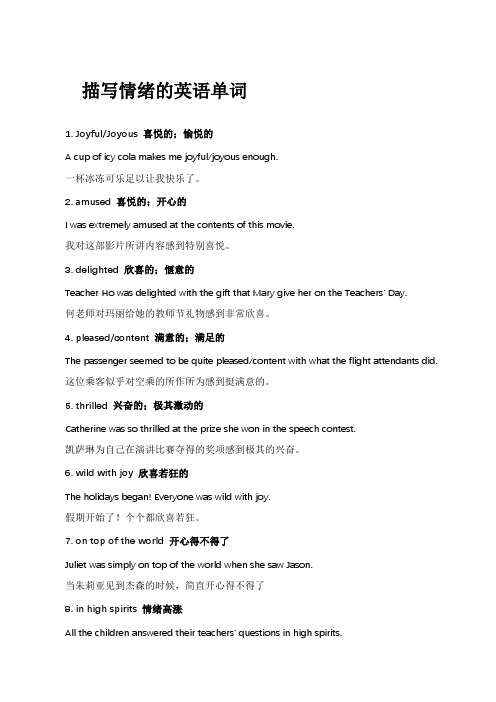
描写情绪的英语单词1. Joyful/Joyous 喜悦的;愉悦的A cup of icy cola makes me joyful/joyous enough.一杯冰冻可乐足以让我快乐了。
2. amused 喜悦的;开心的I was extremely amused at the contents of this movie.我对这部影片所讲内容感到特别喜悦。
3. delighted 欣喜的;惬意的Teacher Ho was delighted with the gift that Mary give her on the Teachers' Day.何老师对玛丽给她的教师节礼物感到非常欣喜。
4. pleased/content 满意的;满足的The passenger seemed to be quite pleased/content with what the flight attendants did. 这位乘客似乎对空乘的所作所为感到挺满意的。
5. thrilled 兴奋的;极其激动的Catherine was so thrilled at the prize she won in the speech contest.凯萨琳为自己在演讲比赛夺得的奖项感到极其的兴奋。
6. wild with joy 欣喜若狂的The holidays began! Everyone was wild with joy.假期开始了!个个都欣喜若狂。
7. on top of the world 开心得不得了Juliet was simply on top of the world when she saw Jason.当朱莉亚见到杰森的时候,简直开心得不得了8. in high spirits 情绪高涨All the children answered their teachers' questions in high spirits.所有的孩子都兴高采烈地回答老师的提问。
心情类的英语单词
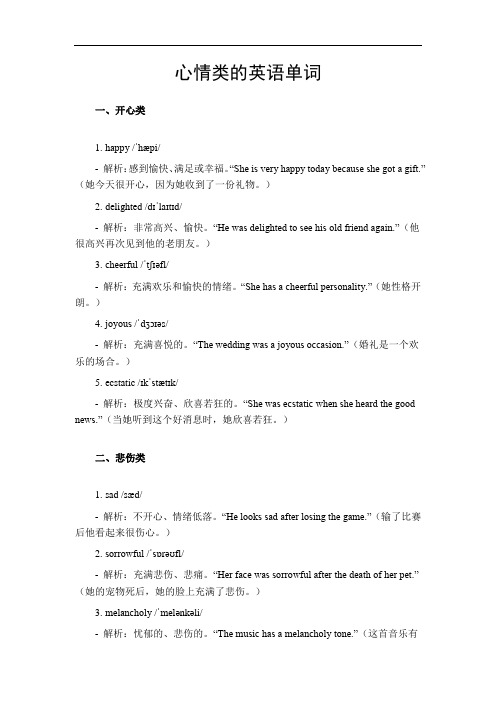
心情类的英语单词一、开心类1.happy /ˈhæpi/- 解析:感到愉快、满足或幸福。
“She is very happy today because she got a gift.”(她今天很开心,因为她收到了一份礼物。
)2.delighted /dɪˈlaɪtɪd/- 解析:非常高兴、愉快。
“He was delighted to see his old friend again.”(他很高兴再次见到他的老朋友。
)3.cheerful /ˈtʃɪəfl/- 解析:充满欢乐和愉快的情绪。
“She has a cheerful personality.”(她性格开朗。
)4.joyous /ˈdʒɔɪəs/- 解析:充满喜悦的。
“The wedding was a joyous occasion.”(婚礼是一个欢乐的场合。
)5.ecstatic /ɪkˈstætɪk/- 解析:极度兴奋、欣喜若狂的。
“She was ecstatic when she heard the good news.”(当她听到这个好消息时,她欣喜若狂。
)二、悲伤类1.sad /sæd/- 解析:不开心、情绪低落。
“He looks sad after losing the game.”(输了比赛后他看起来很伤心。
)2.sorrowful /ˈsɒrəʊfl/- 解析:充满悲伤、悲痛。
“Her face was sorrowful after the death of her pet.”(她的宠物死后,她的脸上充满了悲伤。
)3.melancholy /ˈmelənkəli/- 解析:忧郁的、悲伤的。
“The music has a melancholy tone.”(这首音乐有一种忧郁的基调。
)4.heartbroken /ˈhɑːtbrəʊkən/- 解析:极度伤心、心碎的。
“She was heartbroken when her boyfriend left her.”(当她的男朋友离开她时,她心碎了。
表示情绪英语单词

表示情绪的英语单词快乐、愉悦happy pleased glad jolly(欣喜若狂的)excited joyful laughing heartilychirrupy英['t? ? r ? p? ]快活的delectable令人快乐的,令人快乐的gladsome快乐的/可喜的good-humored心情快乐的,性情好的hedonic英 [hi:'d? n? k]快乐的joyous adj.快乐的,令人愉悦的;欢娱;喜庆merry欢喜的,快乐的,欣喜若狂的mirthful adj.快乐的,快乐的悲伤、悲伤,懊悔,绝望blue (丧气的,愁闷的), dejected (绝望), depressed(情绪低沉的) , discouraged(气馁的),unfortunate , unhappy ,sadanxious忧虑的,牵挂的rue悲伤的;可怜的怨恨的sore惹起讨厌的,痛心的,悲伤的,沉痛的sorrowful悲伤的,悲伤 / 悲伤的downcast没精打采的,精神不振的forlorn被遗弃的;孤单的,悲凉的,荒芜的gloomy阴暗的;愁闷的glum郁郁寡欢的;愁闷的grievous [英[ ? gri:v? s]] 令人沉痛的,极严重的;难忍耐的melancholy英 [ ? mel ? nk? li]愁闷的,愁闷的miserable悲伤的;不幸的。
悲惨的;悲痛的n. grief /sadness /sorrow沉痛,悲伤。
生气、愤慨upset, mad, angry生气程度相当于" 不爽 "," 生气 ", 和 " 愤慨 "irate a.愤慨的,生气的provoking a.令人生气的,令人愤慨的,煎熬的shirty a.不快乐的,生气的( <英俚>心情坏的,愤慨的 )vexed a. 忧虑的,生气的,犯难的,愤慨的,争辩不休的n.displeasure n.不快,不满,生气可编写可改正vexation n.犯难,焦急,令人生气pique[pi:k].生气,愤慨dudgeon英 [ ? d? d? ? n]n. 生气,不快乐v.get a miff v.生气adv.as mad as a wet hen ad.特别生气exasperatingly ad.令人生气exasperate[ ? g? z? sp? re ? t] v.moodily ad.情绪不定地,易生气地out of temper with sb. ad.生气be offend ed at Sb's words( vt.惹恼;冲犯,冲犯;使讨厌令人不适vi.犯规,冲犯)妒忌、敬羡Thirsty anxious盼望的long for sth. hope for sth.expect sth.look forward to sth.be crazy for sth.。
u开头的表示情绪或者心情的英语形容词
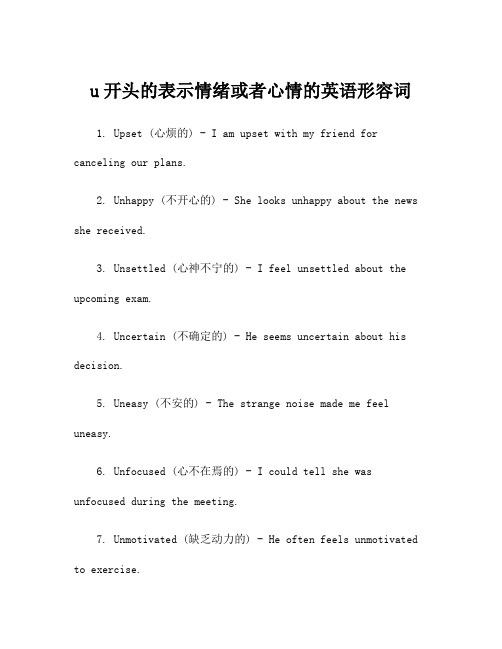
u开头的表示情绪或者心情的英语形容词1. Upset (心烦的) - I am upset with my friend for canceling our plans.2. Unhappy (不开心的) - She looks unhappy about the news she received.3. Unsettled (心神不宁的) - I feel unsettled about the upcoming exam.4. Uncertain (不确定的) - He seems uncertain about his decision.5. Uneasy (不安的) - The strange noise made me feel uneasy.6. Unfocused (心不在焉的) - I could tell she was unfocused during the meeting.7. Unmotivated (缺乏动力的) - He often feels unmotivated to exercise.8. Uninterested (对某事不感兴趣的) - I could tell she was uninterested in the conversation.9. Uninspired (缺乏灵感的) - The writer felt uninspired to write.10. Unenthused (缺乏热情的) - He was unenthused about the party.11. Unbalanced (心情失衡的) - The stress made her feel unbalanced.12. Unimpressed (没有得到印象的) - The performance left me unimpressed.13. Uncomfortable (感到不舒服的) - The chair is uncomfortable to sit on.14. Unbearable (无法忍受的) - The heat outside is unbearable.15. Unloved (感到不被爱的) - The neglected child feels unloved.16. Unfortunate (不幸的) - It's unfortunate that I missed the train.17. Unfulfilled (感到不满足的) - She feels unfulfilled in her current job.18. Unstable (不稳定的) - The economy is in an unstable state.19. Unsatisfied (不满意的) - The customer was unsatisfied with the service provided.20. Unequal (不平等的) - The distribution of resources is unequal in society.21. Unappealing (不具吸引力的) - The menu options were unappealing to me.22. Unwanted (不受欢迎的) - I feel unwanted in this group.23. Unfortunate (不幸的) - It's unfortunate that we haveto cancel the event.24. Unpleasant (令人不愉快的) - The smell in the room was unpleasant.25. Unprepared (没有准备好的) - I feel unprepared for the upcoming presentation.。
心情英语单词
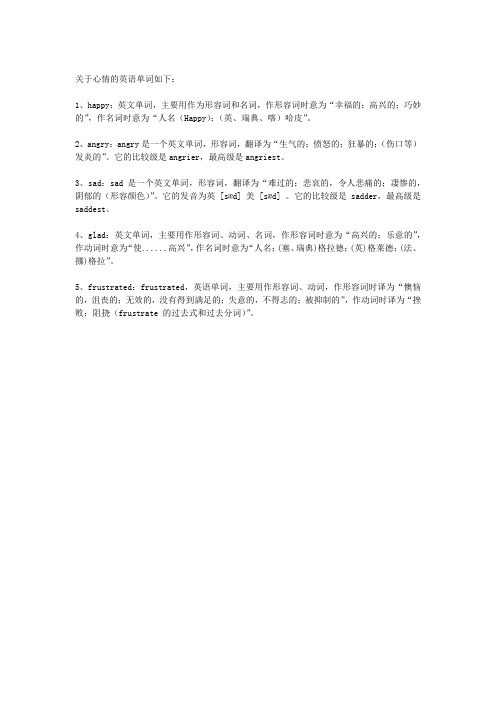
关于心情的英语单词如下:
1、happy:英文单词,主要用作为形容词和名词,作形容词时意为“幸福的;高兴的;巧妙的”,作名词时意为“人名(Happy);(英、瑞典、喀)哈皮”。
2、angry:angry是一个英文单词,形容词,翻译为“生气的;愤怒的;狂暴的;(伤口等)发炎的”。
它的比较级是angrier,最高级是angriest。
3、sad:sad是一个英文单词,形容词,翻译为“难过的;悲哀的,令人悲痛的;凄惨的,阴郁的(形容颜色)”。
它的发音为英[sæd] 美[sæd] 。
它的比较级是sadder,最高级是saddest。
4、glad:英文单词,主要用作形容词、动词、名词,作形容词时意为“高兴的;乐意的”,作动词时意为“使......高兴”,作名词时意为“人名;(塞、瑞典)格拉德;(英)格莱德;(法、挪)格拉”。
5、frustrated:frustrated,英语单词,主要用作形容词、动词,作形容词时译为“懊恼的,沮丧的;无效的,没有得到满足的;失意的,不得志的;被抑制的”,作动词时译为“挫败;阻挠(frustrate 的过去式和过去分词)”。
最新表示情绪的英语单词

快乐。
兴奋Happy /pleased /glad /jolly /Excited /Joyful /Laughing heartilychirrupy 【方】快活的delectable 令人愉快的,使人高兴的gladsome 高兴的/ 可喜的good-humored 心情愉快的,脾气好的hedonic 快乐的joyousmerry欢乐的,愉快的,兴高采烈的mirthful悲伤。
难过,后悔,失望blue,dejected,depressed, discouraged, unfortunate ,unhappy , sad anxious 焦虑的,挂念的rue [] 悲伤的;可怜的悔恨的sore []引起反感的,痛心的,伤心的,悲痛的sorrowful 悲伤的,伤心/忧伤的downcast垂头丧气的,萎靡不振的forlorn[]被遗弃的;孤独的,凄凉的,荒凉的gloomy阴郁的;忧郁的glum []闷闷不乐的;忧郁的grievous []令人悲痛的,极严重的;难忍受的melancholy []忧郁的,郁闷的miserable []痛苦的;不幸的。
凄惨的;悲哀的n.grief /sadness /sorrow 悲痛,悲伤。
生气。
愤怒upset, mad, 和angry. 生气程度相当于"不爽","生气",和"愤怒"irate a.发怒的,生气的provoking a.令人生气的,使人愤怒的,难熬的shirty a.不高兴的,生气的vexed a.焦急的,生气的,为难的,恼怒的,争论不休的n.displeasure n.不快,不满,生气vexation n.为难,着急,使人生气pique n.生气,愤怒dudgeon n.生气,不高兴v.get a miff v.生气adv.as mad as a wet hen ad.非常生气exasperatingly ad.令人生气moodily ad.情绪不定地,易生气地out of temper with sb. ad.生气be offended at Sb's words嫉妒羡慕thirstyanxious 渴望的long for sth.hope for sth.expect sth.look forward to sth.be crazy for sth.。
心情类单词英语40个
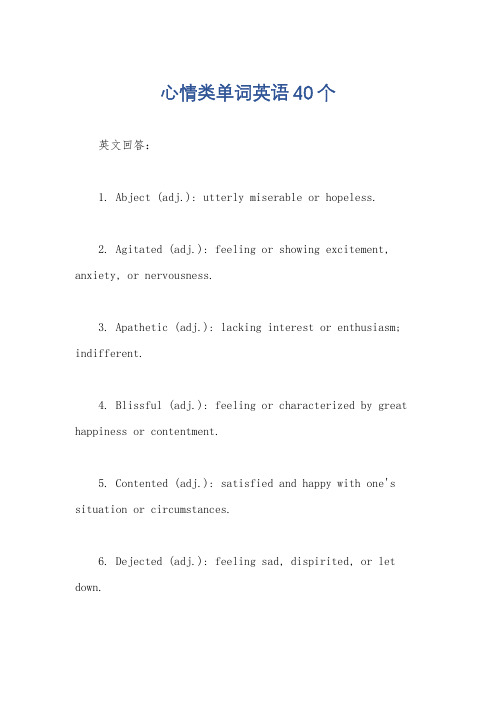
心情类单词英语40个英文回答:1. Abject (adj.): utterly miserable or hopeless.2. Agitated (adj.): feeling or showing excitement, anxiety, or nervousness.3. Apathetic (adj.): lacking interest or enthusiasm; indifferent.4. Blissful (adj.): feeling or characterized by great happiness or contentment.5. Contented (adj.): satisfied and happy with one's situation or circumstances.6. Dejected (adj.): feeling sad, dispirited, or let down.7. Desolate (adj.): feeling or showing great sadness or loneliness; forlorn.8. Disconsolate (adj.): feeling or showing extreme or inconsolable grief or sadness.9. Ecstatic (adj.): feeling or showing intense joy or delight.10. Elated (adj.): feeling or showing great joy or excitement.11. Euphoric (adj.): feeling or characterized by intense feelings of happiness, excitement, or well-being.12. Exuberant (adj.): showing or characterized by great enthusiasm, excitement, or joy.13. Flabbergasted (adj.): completely amazed or astonished.14. Forlorn (adj.): feeling or showing sadness,abandonment, or loneliness.15. Frenzied (adj.): extremely excited, agitated, or wild.16. Fulfilled (adj.): feeling satisfied and happy with one's life or achievements.17. Grateful (adj.): feeling or showing appreciation or thanks.18. Heartbroken (adj.): feeling deep sadness or grief, especially over a loss or disappointment.19. Hopeful (adj.): feeling or showing optimism or anticipation of something good.20. Humiliated (adj.): feeling or showing a sense of shame or disgrace.21. Jubilant (adj.): feeling or showing great joy or triumph.22. Melancholy (adj.): feeling or showing sadness, gloom, or depression.23. Motivated (adj.): having a strong desire or reason to do something.24. Nostalgic (adj.): feeling or evoking a sense of longing for the past.25. Overwhelmed (adj.): feeling or being burdened or unable to cope with something.26. Pessimistic (adj.): tending to see the worst in a situation or expect the worst.27. Piteous (adj.): deserving or exciting pity because of suffering or misfortune.28. Proud (adj.): feeling or showing a high opinion of oneself or one's accomplishments.29. Rapturous (adj.): feeling or expressing great joy or enthusiasm.30. Relieved (adj.): feeling or showing a sense of relief from anxiety or worry.31. Remorseful (adj.): feeling or showing guilt or regret for a wrong committed.32. Resentful (adj.): feeling or showing anger or bitterness towards someone or something.33. Sanguine (adj.): optimistic or cheerful.34. Serene (adj.): calm, peaceful, and untroubled.35. Thankful (adj.): feeling or showing gratitude or appreciation.36. Triumphant (adj.): feeling or showing great joy or pride at having achieved something.37. Upset (adj.): feeling or showing distress or agitation.38. Wistful (adj.): feeling a sense of longing or desire, often for something unattainable.39. Zenith (n.): the highest point of achievement or prosperity.40. Nadir (n.): the lowest point of despair or unhappiness.中文回答:1. 卑鄙(adj),极度悲惨或绝望。
d开头表示心情的英语单词

以下是一些以d开头的表示心情的英语单词,以及它们的具体内容、看法和文章。
1.DelightedDelighted 是一个表示非常高兴和愉快的单词。
当你感到非常高兴和兴奋时,你可以使用这个词来表达你的心情。
例如,“I am delighted to hear that you passed the exam.”(我很高兴听到你考试及格了。
)看法: Delighted 是一个积极、正面的词汇,可以用来表达对他人的赞扬和感激之情。
2.DevastatedDevastated 是一个表示非常悲伤和失望的单词。
当你感到非常难过和失落时,你可以使用这个词来表达你的心情。
例如,“I am devastated to hear about the loss of your loved one.”(听到你失去亲人的消息,我感到非常难过。
)看法: Devastated 是一个消极、负面的词汇,可以用来表达对他人的同情和支持。
3.DisappointedDisappointed 是一个表示失望的单词。
当你感到失望或对某件事情感到不满时,你可以使用这个词来表达你的心情。
例如,“I am disappointed with the outcome of the game.”(我对比赛结果感到失望。
)看法: Disappointed 是一个中性词汇,可以用来表达对他人的不满或失望之情。
4.DismayedDismayed 是一个表示惊恐和不安的单词。
当你感到惊恐或不安时,你可以使用这个词来表达你的心情。
例如,“I am dismayed to hear about the natural disaster.”(听到发生自然灾害的消息,我感到非常惊恐。
)看法: Dismayed 是一个中性词汇,可以用来表达对他人的关心和支持。
5.EcstaticEcstatic 是一个表示非常高兴和兴奋的单词。
当你感到非常高兴和兴奋时,你可以使用这个词来表达你的心情。
表示情绪的英语单词
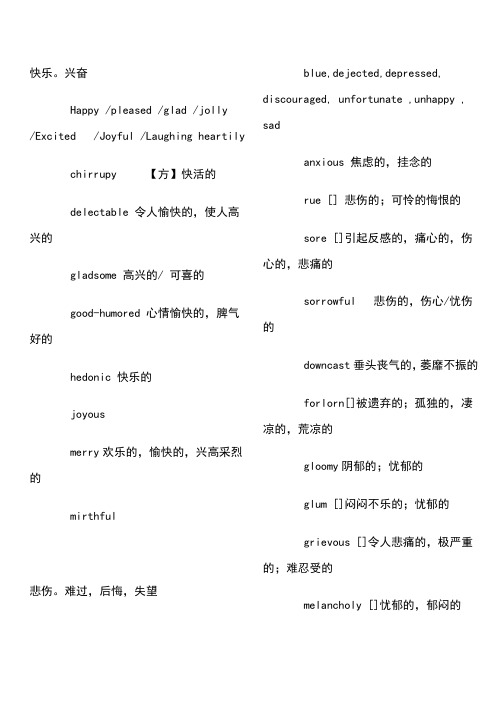
快乐。
兴奋Happy /pleased /glad /jolly /Excited /Joyful /Laughing heartily chirrupy 【方】快活的delectable 令人愉快的,使人高兴的gladsome 高兴的/ 可喜的good-humored 心情愉快的,脾气好的hedonic 快乐的joyousmerry欢乐的,愉快的,兴高采烈的mirthful悲伤。
难过,后悔,失望blue,dejected,depressed, discouraged, unfortunate ,unhappy , sadanxious 焦虑的,挂念的rue [] 悲伤的;可怜的悔恨的sore []引起反感的,痛心的,伤心的,悲痛的sorrowful 悲伤的,伤心/忧伤的downcast垂头丧气的,萎靡不振的forlorn[]被遗弃的;孤独的,凄凉的,荒凉的gloomy阴郁的;忧郁的glum []闷闷不乐的;忧郁的grievous []令人悲痛的,极严重的;难忍受的melancholy []忧郁的,郁闷的miserable []痛苦的;不幸的。
凄惨的;悲哀的/sadness /sorrow 悲痛,悲伤。
生气。
愤怒upset, mad, 和angry. 生气程度相当于"不爽","生气",和"愤怒"irate a.发怒的,生气的provoking a.令人生气的,使人愤怒的,难熬的shirty a.不高兴的,生气的vexed a.焦急的,生气的,为难的,恼怒的,争论不休的n.displeasure n.不快,不满,生气vexation n.为难,着急,使人生气pique n.生气,愤怒dudgeon n.生气,不高兴v.get a miff v.生气adv.as mad as a wet hen ad.非常生气exasperatingly ad.令人生气moodily ad.情绪不定地,易生气地out of temper with sb. ad.生气be offended at Sb's words嫉妒羡慕thirstyanxious 渴望的long for sth.hope for sth.expect sth.look forward to sth. be crazy for sth.。
形容心情的英语单词和音标
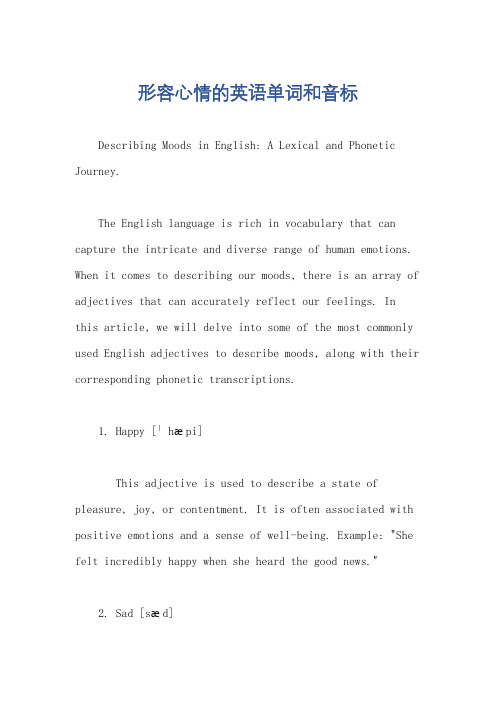
形容心情的英语单词和音标Describing Moods in English: A Lexical and Phonetic Journey.The English language is rich in vocabulary that can capture the intricate and diverse range of human emotions. When it comes to describing our moods, there is an array of adjectives that can accurately reflect our feelings. Inthis article, we will delve into some of the most commonly used English adjectives to describe moods, along with their corresponding phonetic transcriptions.1. Happy [ˈhæpi]This adjective is used to describe a state of pleasure, joy, or contentment. It is often associated with positive emotions and a sense of well-being. Example: "She felt incredibly happy when she heard the good news."2. Sad [sæd]This adjective is used to describe a state of unhappiness or sorrow. It often refers to feelings of melancholy, loss, or disappointment. Example: "The movie ended on a sad note, leaving the audience feeling emotional."3. Angry [ˈæŋgri]This adjective is used to describe a state ofintense annoyance or displeasure. It is often associatedwith feelings of frustration, impatience, or irritation. Example: "He got angry when he realized he had missed the deadline."4. Surprised [səˈpraɪzd]This adjective is used to describe a state of sudden astonishment or amazement. It often refers to feelings of disbelief or confusion caused by unexpected events. Example: "She was surprised to learn that she had won the lottery."5. Nervous [ˈnervəs]This adjective is used to describe a state ofanxiety or tension. It often refers to feelings of fear, unease, or apprehension in anticipation of an event or situation. Example: "Before the exam, he felt very nervous about his performance."6. Confused [kənˈfjuːzd]This adjective is used to describe a state of being puzzled or bewildered. It often refers to feelings of indecision, doubt, or uncertainty about a particular matter. Example: "She was confused about which career path to choose."7. Embarrassed [ɪmˈbærəst]This adjective is used to describe a state of awkwardness or discomfort caused by shame or humiliation.It often refers to feelings of shame or embarrassment about oneself or one's actions. Example: "He felt embarrassedwhen he accidentally spilled his drink on the table."8. Annoyed [əˈnɔɪd]This adjective is used to describe a state of irritation or impatience. It often refers to feelings of aggravation or annoyance caused by someone or somethingthat is irritating or bothersome. Example: "She was annoyed by the constant noise coming from the neighbor's apartment."These are just a few examples of the wide range of English adjectives that can be used to describe moods. The beauty of the English language lies in its ability to capture the nuances and subtleties of human emotions, allowing us to communicate our feelings more accurately and deeply.。
与人的心情有关的英语单词
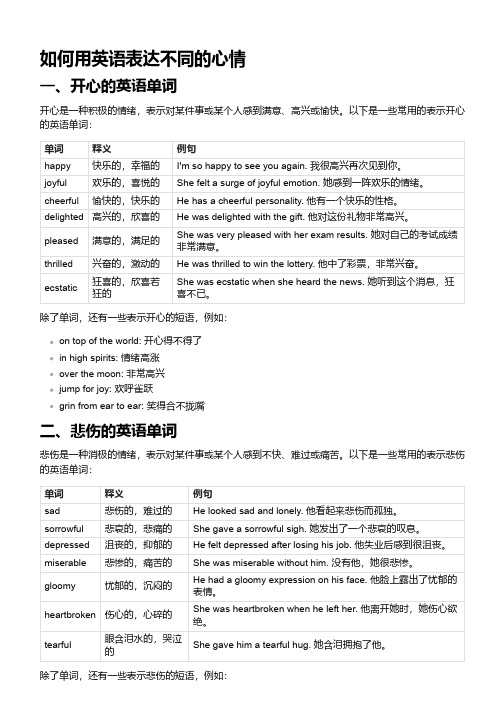
如何用英语表达不同的心情一、开心的英语单词开心是一种积极的情绪,表示对某件事或某个人感到满意、高兴或愉快。
以下是一些常用的表示开心的英语单词:单词释义例句happy快乐的,幸福的I'm so happy to see you again. 我很高兴再次见到你。
joyful欢乐的,喜悦的She felt a surge of joyful emotion. 她感到一阵欢乐的情绪。
cheerful愉快的,快乐的He has a cheerful personality. 他有一个快乐的性格。
delighted高兴的,欣喜的He was delighted with the gift. 他对这份礼物非常高兴。
pleased满意的,满足的She was very pleased with her exam results. 她对自己的考试成绩非常满意。
thrilled兴奋的,激动的He was thrilled to win the lottery. 他中了彩票,非常兴奋。
ecstatic 狂喜的,欣喜若狂的She was ecstatic when she heard the news. 她听到这个消息,狂喜不已。
除了单词,还有一些表示开心的短语,例如:on top of the world: 开心得不得了in high spirits: 情绪高涨over the moon: 非常高兴jump for joy: 欢呼雀跃grin from ear to ear: 笑得合不拢嘴二、悲伤的英语单词悲伤是一种消极的情绪,表示对某件事或某个人感到不快、难过或痛苦。
以下是一些常用的表示悲伤的英语单词:单词释义例句sad悲伤的,难过的He looked sad and lonely. 他看起来悲伤而孤独。
sorrowful悲哀的,悲痛的She gave a sorrowful sigh. 她发出了一个悲哀的叹息。
形容心情的英语单词

形容心情的英语单词(共2页)--本页仅作为文档封面,使用时请直接删除即可----内页可以根据需求调整合适字体及大小--形容心情的英语单词【心情】高兴 be delight withdelightjoylift up one's headrejoicerejoicinghappy开心animal spiritsanimationvitalitybe exasperated againstget angry伤心griefgrievehurtsmart fromteen生气 animal spiritsanimationvitalitybe exasperated againstget angry 【性格】able 有才干的,能干的; adaptable 适应性强的 active 主动的,活跃的; aggressive 有进取心的 ambitious 有雄心壮志的; amiable 和蔼可亲的 amicable 友好的; analytical 善于分析的 apprehensive 有理解力的;aspiring 有志气的,有抱负的 audacious 大胆的,有冒险精神的; capable 有能力的,有才能的 careful 办理仔细的; candid 正直的 competent 能胜任的;constructive 建设性的 cooperative 有合作精神的; creative 富创造力的 dedicated 有奉献精神的; dependable 可靠的 diplomatic 老练的,有策略的; disciplined 守纪律的 dutiful 尽职的; well--educated 受过良好教育的 efficient 有效率的;energetic 精力充沛的 expressivity 善于表达; faithful 守信的,忠诚的 frank 直率的,真诚的; generous 宽宏大量的 genteel 有教养的; gentle 有礼貌的humorous 有幽默; impartial 公正的 independent 有主见的; industrious 勤奋的ingenious 有独创性的; motivated 目的明确的 intelligent 理解力强的; learned 精通某门学问的 logical 条理分明的; methodical 有方法的 modest 谦虚的;objective 客观的 precise 一丝不苟的; punctual 严守时刻的 realistic 实事求是的; responsible 负责的 sensible 明白事理的; sporting 光明正大的 steady 踏实的; systematic 有系统的 purposeful 意志坚强的; sweet-tempered 性情温和的temperate 稳健的; tireless 孜孜不倦的【性质】physical property 物理性质chemical property 化学性质2。
形容心情的英语词语
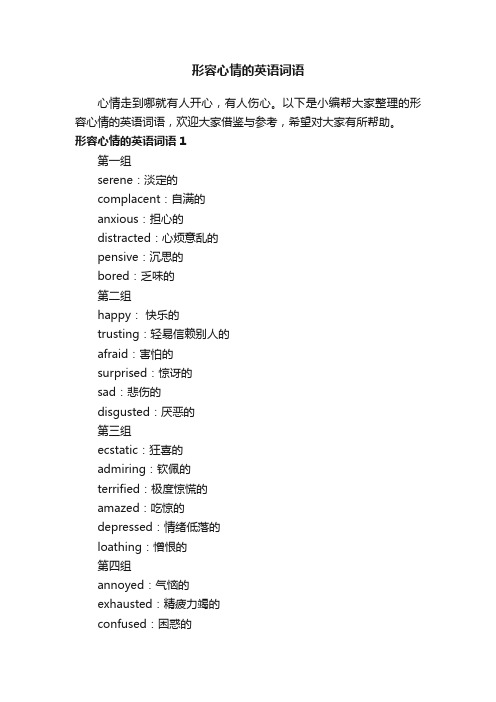
形容心情的英语词语心情走到哪就有人开心,有人伤心。
以下是小编帮大家整理的形容心情的英语词语,欢迎大家借鉴与参考,希望对大家有所帮助。
形容心情的英语词语1第一组serene:淡定的complacent:自满的anxious:担心的distracted:心烦意乱的pensive:沉思的bored:乏味的第二组happy:快乐的trusting:轻易信赖别人的afraid:害怕的surprised:惊讶的sad:悲伤的disgusted:厌恶的第三组ecstatic:狂喜的admiring:钦佩的terrified:极度惊慌的amazed:吃惊的depressed:情绪低落的loathing:憎恨的第四组annoyed:气恼的exhausted:精疲力竭的confused:困惑的paranoid:患妄想狂的smug:自鸣得意的nervous:紧张的第五组angry:生气的sleepy:欲睡的clueless:无能的hysterical:情绪异常激动的confident:有自信的ashamed:耻辱的第六组furious:愤怒的embarassed:尴尬的overwhelmed:崩溃的hopeful:抱有希望的lonely:寂寞的lovestruck:热恋中的第七组jealous:嫉妒的mischievous:淘气的teary-eyed:眼含泪水的grinning:笑嘻嘻The scream:惊呼的cute:可爱的.形容心情的英语词语21、frustrated无奈。
这应该是老外在工作场合使用最多的表示心情的单词,没有之一,以前专门写过一篇文章解释过。
=angry,但极少见美国人用angry的,一般都直接说I'm pissed off. I did this just to piss him off. 可能是angry较正式,而pissedoff很口语,而且侧重于一种短暂的生气状态,翻译成「被惹生气」,「气死了」比较好。
- 1、下载文档前请自行甄别文档内容的完整性,平台不提供额外的编辑、内容补充、找答案等附加服务。
- 2、"仅部分预览"的文档,不可在线预览部分如存在完整性等问题,可反馈申请退款(可完整预览的文档不适用该条件!)。
- 3、如文档侵犯您的权益,请联系客服反馈,我们会尽快为您处理(人工客服工作时间:9:00-18:30)。
关于心情的英语单词:
mood n. 情绪,语气;心境;气氛
in a good mood 心情好,好心情
emotion,情感;情绪
atmosphere, n. 气氛;大气;空气
tone, n. 语气;色调;音调;音色
spirit, n. 精神;心灵;情绪;志气;烈酒
feeling n. 感觉,触觉;感情,情绪;同情
愉快情绪的词
happy,glad,joyful,excited,delighted,pleased,satisfied,pleasant,satisfactory,comfortable,fine,sunny,bright,high ,etc.
低落情绪:
sad,unhappy,sorry,terrible,horrible,frightened,worried,unpleasant,unexcited,grieved,low,blue,dissatisfactory,etc.
祝你开心如意!O(∩_∩)O~~
/view/ab7a69264b35eefdc8d333aa.html?from=related&hasrec=1
哈哈,你写的很不错啊——用了很多高档句型和结构!
不过,里面还有个别失误。
现修改如下:
Views vary drastically between the author and the lecturer on how to erase the cane toads from Australia which have caused severe ecological problems in the country. Each party has reasonable 【opinion——opinions最好用复数】and convincing evidence.
The author proposes the first method that we 【could——can】build a national fence to block the advance of the toads. This approach is reliable for the reason that it has been【use——used 】before and turned out to 【have】【the去掉】positive results. In the contrast, the lecturer believes that this approach has a fatal disadvantage that it 【couldn’t——can't】erase the toads in the rivers and streams. The toads 【could——can】still 【establish——exist and prosper】from one side to the other.
The author insists that toads 【could——can】be captured and destroyed by volunteers. Young toads and cane toad eggs are especially easier to gather and destroy. Doubt is expressed by the lecturer on the other hand. Admittedly the method will get some success, but it 【could——can】cause ecological disaster when the untrained volunteers have difficulty in distinguishing the toads and the native frogs especially the immature ones.
Opinion is cast by the author that a kind of disease-causing virus developed 【by 】researchers 【could——can】be an efficacious way to control the 【can——cane】toad populations. It will prevent the toads from maturing and reproducing without hurting other species. However, the lecturer strongly disapproves it due to 【the】risk of damage. The infected species which are transported to the South America 【could——can】do harm to the native ones which are vital in that environment. There will be a big price to pay 【when——if 避免与上面重复】the native species suffer this infection.
说明:按照时态和语义表达,文中的could 最好改为can.不过,有个别的不该可以。
例如
最后一个不改也能讲通。
祝你开心如意!O(∩_∩)O~~。
